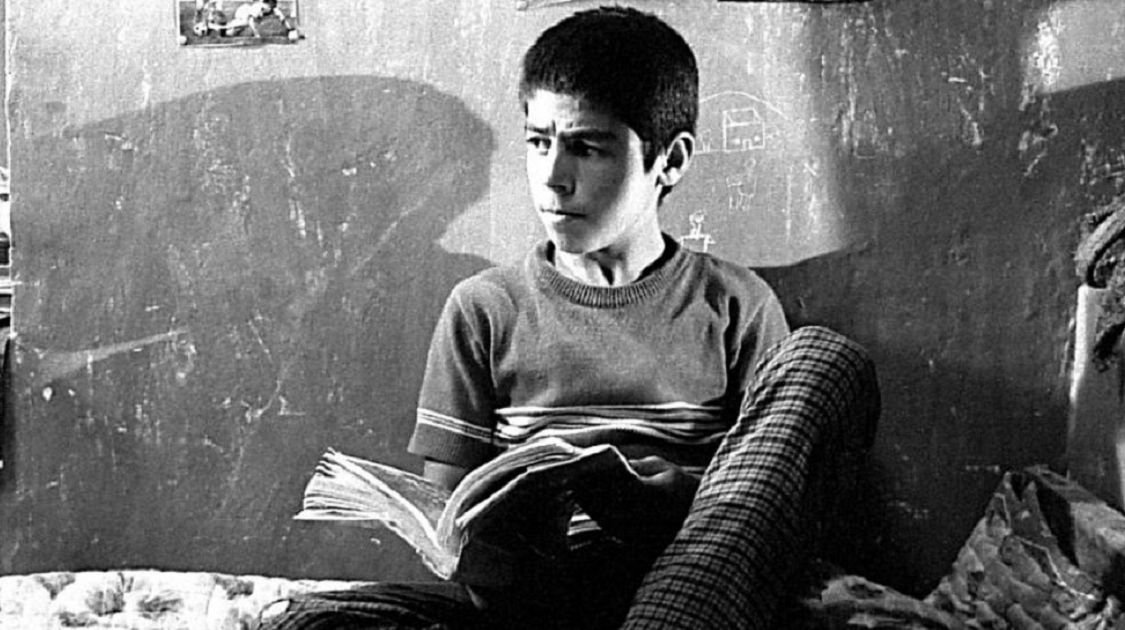This week at Portland State’s 5th Avenue Cinema—Portland’s only student-run theater—our film curators have chosen to project an Iranian film, The Traveler.
This 1974 film is Abbas Kiarostami’s first directed drama film, which now lives in The Criterion Collection. The Traveler gives us a glimpse into the lives of the Iranian people that lived in the early ‘70s. It follows an impoverished boy named Qassem Julayi (Hassan Darabi) that wants nothing more in the world than to attend a soccer game in the capital city of Iran, Tehran. Qassem appears to be devoted exclusively to sports. The child is not obedient to his mother at home, and he performs poorly at school because he is too busy reading sports magazines, which he can hardly afford. Qassem cannot afford to take the 150-mile bus ride to the game, so the resourceful boy attempts to raise funds by taking photos and selling items he does not own.
Owen Peterson of 5th Avenue selected The Traveler for screening this week. Despite the pandemic, he has worked at the cinema for the last two years while studying business at PSU.
During 2020, the cinema wasn’t allowed to encourage any public gathering by screening movies, so the staff briefly became podcasters on KPSU to discuss the films they could not show. For the 5th Ave Podcast, Peterson had also chosen a film created by Kiarostami. “When we were back in podcast time, during the pandemic, I picked one of his movies that I hadn’t seen from a trilogy he did in Iran, to talk about on the podcast,” Peterson said.
“He’s one of the most prominent Middle Eastern directors in the arthouse/cinema community and had only made one movie in English after being more successful in the west,” Peterson said. The first movie Peterson watched from the director was Certified Copy, the only one in English. “It has one of my favorite actors in it—Juliette Binoche—and I was just blown away by how good it was and how similar it was to the movies I liked, besides him being from a different region and his way of seeing things differently—but also similarly—to the other directors I like,” Peterson explained.
Certified Copy got Peterson excited about the director and encouraged him to watch more. “I bought a blu-ray of another film by this director—one of his most famous ones, which is called Close Up—and it had this movie [The Traveler] featured in the disc’s bonus features,” he said. Through these bonus features, he found and eventually watched The Traveler.
“The Traveler, in a lot of ways, inspired Close Up because Close Up is a reenactment of real events where a guy in Iran pretended to be another film director, and he got imprisoned for it because he took it way too far and got found out,” Peterson said. The man that Close Up was based on believed that he was Mohsen Makhmalbaf. “His favorite movie was the Traveler, and he saw himself in the role of the kid,” Peterson explained. “He projected a lot of his own issues in his life—like being ostracized and being misunderstood—he projected a lot of that onto that character, and that’s why they included it in the special features, because he basically based his life on the character.”
Additionally, Peterson chose this movie because he felt that he has a personal connection. “I’m a huge soccer fan—I played it since I was really young, and the world cup actually starts this week,” he said. “And my stint here is coming to an end in spring, so I felt like I needed to show a movie that depicted soccer in some way, and it just happened to be that I had seen this movie, and it was perfect.”
Iran’s people exist at the heart of this film. “It seems so, I think, embedded into their culture, and if you see this movie, you’ll see how much it’s really about depicting day-to-day life, but it’s done in a way that’s more amplified because there’s a progression that needs to be made in the story,” Peterson said.
“I think it’s really for Iranian people to feel represented, but also, widening that lens, what hits me about it is how I connect it to my boyhood experience,” he said. “It’s really similar to this French movie that’s much more popular, called The 400 Blows.” Peterson explained that the 1959 French film follows a young boy that finds himself getting into trouble more often than not. “You get to see what the symptoms are in his life that makes him act that way, and it’s sort of the same in The Traveler,” he said. As a result, the viewer can examine their own life and see what events from their past contributed to their life today. “I think it’s a really interesting thing to think about—for a lot of men looking back at boyhood in that way—that’s what really stuck with me, but also the soccer connection,” Peterson said.
Peterson noted that many actors in The Traveler are not professional actors. “They’re just people that the director knew or met that fit the role,” he said. “This director is probably the most prominent Iranian director in the west, and he is known for making a lot of films about children and using children that aren’t actors in the roles, plus this is his first film, so it’s sort of him practicing and experimenting with that.”
“It can easily be taken as a boring movie if you are not used to films being grounded in reality,” Peterson said. He explained how intentional and essential it is for this director to have a Middle Eastern film viewed by a western audience and to have their voice heard. “We’re in a specific microcosm like Portland, Oregon, in America—it’s always really important to acknowledge and see other points of view from the point of view of someone there, rather than someone here trying to explain something going on somewhere else,” Peterson said. “I think that when you have someone from the country and the city who’s in that life telling the story, it’s going to be more authentic than somebody from America reading about it or watching a video or even going there to explain it.”
Peterson warned audiences that a couple of scenes in the film may be challenging for some viewers. “There’s a scene where the boy gets beaten by his mom and his teacher, and that’s pretty tough to watch,” he said. “I think people that are sensitive to those things or might get triggered by that—they might not enjoy it—but I find its realistic depiction of life to be universally shared.”
“It’s about depicting life itself more than it is about making a movie—than making a spectacle,” Peterson said. The film isn’t looking to impress you with game-changing visuals or an experimental framing—it’s showing the audience what Iranian life was like for a young boy in the early 1970s. “It’s more about depiction rather than entertainment—but it also is entertaining because real life is pretty entertaining and spectacular, I think,” Peterson added. “I think when movies are about kids, there’s always this youthful ambiguity—whether it’s gender or class or whatever it is—people are just so innocent and pure when they’re young that anyone can really look at it and see a past version of themselves.”
Students can see The Traveler this weekend—for free—at the 5th Avenue Cinema. You can catch a showing this Friday or Saturday at 7 p.m. and 9:30 p.m., or the Sunday screening at 3 p.m.






